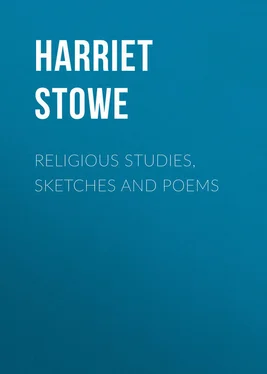Harriet Stowe - Religious Studies, Sketches and Poems
Здесь есть возможность читать онлайн «Harriet Stowe - Religious Studies, Sketches and Poems» — ознакомительный отрывок электронной книги совершенно бесплатно, а после прочтения отрывка купить полную версию. В некоторых случаях можно слушать аудио, скачать через торрент в формате fb2 и присутствует краткое содержание. Жанр: foreign_prose, на английском языке. Описание произведения, (предисловие) а так же отзывы посетителей доступны на портале библиотеки ЛибКат.
- Название:Religious Studies, Sketches and Poems
- Автор:
- Жанр:
- Год:неизвестен
- ISBN:нет данных
- Рейтинг книги:5 / 5. Голосов: 1
-
Избранное:Добавить в избранное
- Отзывы:
-
Ваша оценка:
- 100
- 1
- 2
- 3
- 4
- 5
Religious Studies, Sketches and Poems: краткое содержание, описание и аннотация
Предлагаем к чтению аннотацию, описание, краткое содержание или предисловие (зависит от того, что написал сам автор книги «Religious Studies, Sketches and Poems»). Если вы не нашли необходимую информацию о книге — напишите в комментариях, мы постараемся отыскать её.
Religious Studies, Sketches and Poems — читать онлайн ознакомительный отрывок
Ниже представлен текст книги, разбитый по страницам. Система сохранения места последней прочитанной страницы, позволяет с удобством читать онлайн бесплатно книгу «Religious Studies, Sketches and Poems», без необходимости каждый раз заново искать на чём Вы остановились. Поставьте закладку, и сможете в любой момент перейти на страницу, на которой закончили чтение.
Интервал:
Закладка:
The apocryphal gospels have busied themselves in inventing legends of this child-life of Jesus. Nothing so much shows the difference between the false and the true as these apocryphal gospels compared with the real. Jesus is represented there as a miraculous child, using supernatural power for display among his schoolmates and for the gratification of childish piques and resentments.
The true gospel gives but one incident of the child-life of Jesus, and that just at the time when childhood is verging into youth; for the rest, we are left to conjecture.
We are told that his infancy was passed in the land of Egypt. Jesus was the flower of his nation, – he was the blossom of its history, – and therefore it seemed befitting that his cradle should be where was the cradle of his great forerunner, Moses, on the banks of the Nile. The shadows of the Pyramids, built by the labors of his ancestors, were across the land of his childhood, and the great story of their oppression and deliverance must have filled the thoughts and words of his parents. So imbued was the Jewish mind with the habit of seeing in everything in their history the prophecy and type of the great Fulfiller, that St. Matthew speaks of this exile in Egypt as having occurred that the type might find completeness, and that Israel, in the person of its Head and Representative, might a second time be called out of Egypt: —
"That it might be fulfilled that was spoken of the Lord by the prophet,
"Out of Egypt have I called my son."
We do not know with any definiteness the length of this sojourn in Egypt, nor how much impression the weird and solemn scenery and architecture of Egypt may have made upon the susceptible mind of the child; but to the parents it must have powerfully and vividly recalled all that ancient and prophetic literature which in every step pointed to their wonderful son. The earliest instructions of Jesus must have been in this history and literature of his own nation – a literature unique, poetic, and sublime. But we have no tidings of him till that time in his history when, according to the customs of his people, he was of age to go up to the great national festival at Jerusalem.
The young Jewish boy was instructed all the earlier years of his life in view of this great decisive step, which, like confirmation in the Christian Church, ranked him as a fully admitted member of the house of Israel. It was customary to travel to Jerusalem in large companies or caravans, beguiling the way with hymns of rejoicing as they drew nigh to the holy city. Jesus, probably, was one of many boys who for the first time were going up to their great national festival.
One incident only of this journey is given, but that a very striking one. After the feast was over, when the caravan was returning, they passed a day's journey on their way without perceiving that the child was not among the travelers. This – in a large company of kinsfolk and acquaintance, and where Jesus might have been, as he always afterward seemed to be, a great personal favorite – was quite possible. His parents, trusting him wholly, and feeling that he was happy among friends, gave themselves no care till the time of the evening encampment. Then, discovering their loss, they immediately retraced their steps the next day to Jerusalem, inquiring for him vainly among their acquaintances. They at last turned their steps toward the outer courts of the temple, where was the school of the learned Rabbins who explained the law of God. There, seated at their feet, eager and earnest, asking them questions and hearing their answers, the child Jesus had awakened to a new and deeper life, and become so absorbed as to forget time, place, friends, and everything else in the desire to understand the Holy Word.
It is a blot upon this beautiful story to speak of Jesus as "disputing" with the teachers of his nation, or setting himself up to instruct them. His position was that of a learner; we are not told that he asserted anything, but that he listened and asked questions. The questions of a pure child are often the most searching that can be asked; the questions of the holy child Jesus must have penetrated to the very deepest of divine mysteries. Those masterly discussions of the sayings of the Rabbins, which years after appeared in the Sermon on the Mount, may have sprung from seeds thus dropped into the childish mind.
But, while he is thus absorbed and eager, his soul burning with newly kindled enthusiasm, suddenly his parents, agitated and distressed, lay hold on him with tender reproach: "Son, why hast thou thus dealt with us? Behold, thy father and I have sought thee sorrowing."
Jesus answers, as he so often did in after life, as speaking almost unconsciously out of some higher sphere, and in higher language than that of earth: "How is it that ye sought me? Did ye not know that I must be about my Father's business?"
It seemed to say, "Why be alarmed? is not this my Father's house; is not this study of his law my proper work; and where should I be but here?"
But immediately it is added, "He went down to Nazareth and was subject to them." Even Christ pleased not himself; the holiest fire, the divinest passion, was made subject to the heavenly order, and immediately he yielded to the father and mother whom God had made his guides an implicit obedience.
We have here one glimpse of a consuming ardor, a burning enthusiasm, which lay repressed and hidden for eighteen years more, till the Father called him to speak.
That simple, natural utterance in the child's mouth – "My Father" – shows the secret of the holy peace which kept him happy in waiting. The Father was a serene presence, an intimate and inward joy. In the beautiful solitudes about Nazareth the divine benediction came down upon him: —
"I will be as the dew to Israel:
He shall grow as the lily,
And cast forth his roots as Lebanon."
These two natural symbols seem fittest to portray the elements of that holy childhood which grew to holiest manhood. They give us, as its marked characteristics, the shining purity of the lily and the grand strength and stability of the cedars of Lebanon.
VI
GENTILE PROPHECIES OF CHRIST
"Now when Jesus was born in Bethlehem of Judæa, in the days of Herod the king, behold there came wise men to Jerusalem, saying, Where is he that is born King of the Jews? for we have seen his star in the east, and are come to worship him."
Was the Messiah to be the King of the Jews alone? No; he was for the world; he was the Good Shepherd of nations, and declared that he had "other sheep, not of this fold."
It seems to be most striking that, in the poetical and beautiful account of the birth of Jesus, there is record of two distinct classes who come to pay him homage – not only the simple-minded and devout laboring people of the Jews, but also the learned sages of the Gentiles.
There are constant intimations throughout the Old Testament that God's choice of the Jews was no favoritism; that he had not forgotten other races, but was still the God and Father of mankind; and that he chose Israel not to aggrandize one people, but to make that people his gift-bearers to the whole world.
There are distinct evidences in the Old Testament that the coming Saviour was caring for others beside the Jewish race. Witness his gracious promise to the slave Hagar that he would bless her descendants. In the very family line from which Messiah was to be born a loving and lovely Moabite woman was suffered to be introduced as the near ancestress of King David, and the name of the Gentile Ruth stands in the genealogy of Jesus as a sort of intimation that he belonged not to a race but to the world. In a remarkable passage of Isaiah (xliv. 28, xlv. 1, 4, 5) Jehovah, proclaiming his supreme power, declares himself to be He
Читать дальшеИнтервал:
Закладка:
Похожие книги на «Religious Studies, Sketches and Poems»
Представляем Вашему вниманию похожие книги на «Religious Studies, Sketches and Poems» списком для выбора. Мы отобрали схожую по названию и смыслу литературу в надежде предоставить читателям больше вариантов отыскать новые, интересные, ещё непрочитанные произведения.
Обсуждение, отзывы о книге «Religious Studies, Sketches and Poems» и просто собственные мнения читателей. Оставьте ваши комментарии, напишите, что Вы думаете о произведении, его смысле или главных героях. Укажите что конкретно понравилось, а что нет, и почему Вы так считаете.












